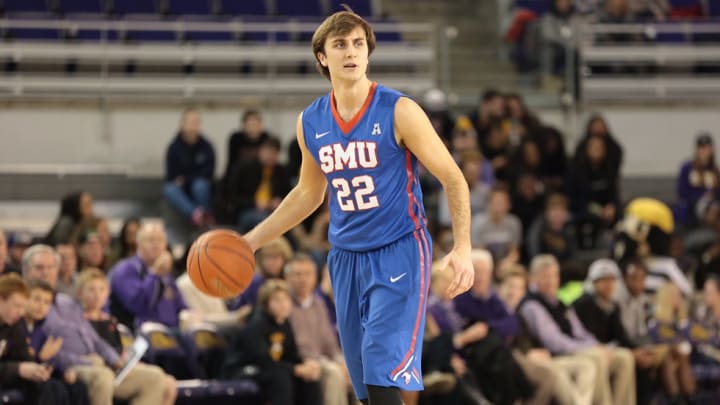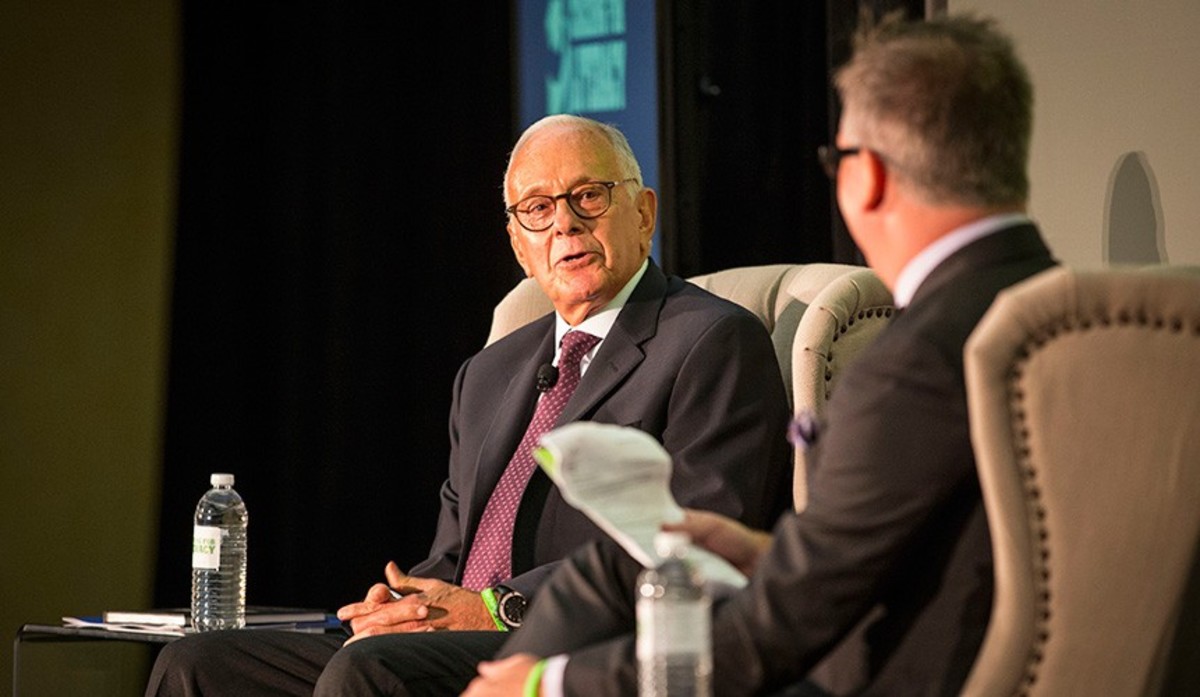Inspired by childhood friendship, SMU's Jonathan Wilfong runs nonprofit aiming to end illiteracy

Growing up as friends in east Memphis, Jonathan Wilfong and Andrew Renshaw devoured books, reading until their eyes hurt or their parents told them to turn off the light. Wilfong, who just finished his junior season as a walk-on guard for SMU's basketball team, preferred Harry Potter. Renshaw, now a junior pre-med student at Vanderbilt, would wait until his parents left the room, then sneak over to his window and use the streetlight filtering through the glass to finish his latest Lord of the Rings.
As high school seniors at Memphis University School three years ago, the two decided to combine their affinity for books and basketball after their English teacher gave them a vague and open-ended assignment: Create and do some sort of community service project ... or take a final exam.
Jonathan and Andrew had gotten a first-hand look at the importance of literacy while playing AAU basketball on Memphis's Team Hardaway (named after former Memphis State and NBA star Penny Hardaway) with a hulking 13-year-old who had five-star football talent but a third-grade reading level.
Frank Herron did everything he could to hide the truth. In restaurants, he ordered the same meal as Wilfong, or pointed to a picture on a menu. At drive-thrus, he ordered the number of a sandwich, never the name. A wizard-like memory for numbers—Frank could recall jerseys of past players and scores from weeks prior—masked his struggles with words. But eventually, Jonathan's family (his father, John, coached the AAU team) caught on, and gently confronted Frank one day, asking if he knew how to read. Frank brushed it off as a ridiculous question. Of course I know how. Then John handed Herron a copy of the April 8, 2008, edition of Sports Illustrated, which featured golfer Adam Scott on the cover, and asked him to prove it.
"I wasn't emotional, but I was stumbling with my words," Herron says. "I was embarrassed at first but the Wilfongs, they're family to me. They helped me understand it's not about having a disability, it's about what you do with that disability."
John, who played for Memphis State (as it was known, when the Tigers advanced to the 1985 Final Four), understood what it would take to survive academically at the next level, and assured Frank they would help him. "We knew he wasn't a kid who couldn't learn—he just didn't have resources," John says. They met with Herron's mother, Wanlisha Hawkins, and devised a plan. Herron attended two tutoring sessions a week, writing book reports on his own. He spent multiple afternoons at the Wilfong house, where Catherine Wilfong would read to him and help him with school projects. By the time he started his freshman year of high school, Frank could read at a seventh grade level.
"The first trip we took for basketball, he gave a kid $2 to buy some potato chips. Well he only brought $5 for the whole trip," John says. "When I asked him, 'Why'd you give him $2?' he said, 'Coach, he need it more than me.' Frank was an easy kid to care about and root for."
So when Jonathan's English teacher challenged her class to "help as many kids as you can," if they opted for community service over taking that test, he knew exactly what he wanted to do.
"For a while, we didn't think he was going to get a chance to go to college," Jonathan says of Herron. "But simply because he learned how to read, he'll have so many opportunities. His story, that's where my passion comes from."
Jonathan approached his father, who is well connected in the hoops community, and brainstormed ideas. Drawing inspiration from Caddy for a Cure, where people pay to caddy for their favorite PGA or LPGA golfer with proceeds going to a handful of nonprofit charities, Jonathan and Andrew came up with Coaching for Literacy, aimed to end illiteracy in America.
"Twenty percent of high school graduates are functionally illiterate, which means they can't fill out a job application, or read a prescription. Those people don't have a lot of options, and that's a real issue," says Jonathan, who appeared in 18 games for the 25–5 Mustangs, totaling eight points and five rebounds this season.
On their website, CoachingforLiteracy.org, the nonprofit cites some sobering statistics: Two thirds of kids who can't read at third grade level by the end of that year wind up in poverty or prison at some point in their lives. John Wilfong, who read to his three boys, Jonathan, Bennette and Luke, almost every night when they were little—book most often requested: Chicka Chicka Boom Boom—also references the "6,000 hour gap." That number comes from studies that show children in middle income neighborhoods versus low income neighborhoods typically have a 6,000-hour difference in how much they've read or been read to, which leads to a 30 million word gap. Says John: "We want to give them a chance to succeed."
As Jonathan and Andrew focus on finishing college, day-to-day operations of CFL are run by two full-time staff members back in Memphis. Almost four years since its inception, Coaching for Literacy now includes three full-time fundraising programs. Donation levels range from $1,000 to $5,000, which allows fans to work as an "assistant coach" for a participating school for a day. In that case, fans get to sit on the bench, attend pre-and postgame talks and get an understanding for what game day is like for their favorite team. Teams and coaches from all over the country have participated, including Florida State, Harvard, Memphis, San Francisco and Virginia, among others. All proceeds go the university's local literacy program.
Coaching for Literacy also boasts five college chapters—Memphis, SMU, Vanderbilt, Ole Miss and Mississippi State—where a combined 110 students spend an hour a week volunteering at their local literacy program, which typically involves reading to, or with, an elementary school child. And last August, CFL held its first Revitalizing Literacy event, where SMU coach Larry Brown joined CBSsports.com college basketball writer CBS Sports's Gary Parrish, a longtime CFL supporter, for a live Q&A at the Memphis Botanic Garden. With dinner tickets, a silent auction and private donations, CFL raised more than $100,000 that night. "Memphis is a basketball town, so people have a big appreciation for coach Brown has accomplished, as the only coach to win NCAA and NBA titles," says Renshaw, adding that the audience was rapt as Brown detailed what it was like to coach Allen Iverson with the Philadelphia 76ers.

Courtesy of Coaching For Literacy
Brown, a Hall of Famer who just finished his fourth season at SMU didn't fully realize what he was getting involved with when Jonathan asked him to speak last spring. Now, he's eager to help in any way possible.
"Since I've been in college [coaching], even the pros, I've realized there were so many kids who didn't have the ability to read," says the 75-year-old Brown. "Whatever Jonathan asks me to do, I'll do it. You start looking at what he's done, and you're in awe of him. And I'm just trying to get people to realize, this is a neat thing for everybody to get behind."
As a father and coach, John Wilfong loves that his son has used basketball, a longtime family obsession, as a platform to fight for something bigger. Hoops has a deep history in their lineage. John's father, Gene Wilfong, played at Memphis State (now Memphis) from 1958–59 to 1960–61, and his cousin, Win Wilfong, was a Tigers star from 1955–57 before being drafted by the St. Louis Hawks with the No. 4 pick in the '57 draft and helping them win the '58 NBA title. "It's an honor for us to use basketball, and the history we've had with it, to take something that people need—the ability to read—and help people around the country," John says.
This fall, Coaching for Literacy will celebrate its four-year anniversary. The Wilfongs estimate since October 2012, CFL has donated more than $400,000 to literacy programs around the country. With basketball finished for the season because of NCAA sanctions that prohibit SMU from playing in the postseason, Jonathan—who likes to joke with his friends that he's "double-majoring in Larry Brown and finance"—will spend most his free time on CFL, as they plan their next Revitalizing Literacy event, which this time features a conversation with Ole Miss football coach Hugh Freeze.
CFL chose neon green as its brand color, and Jonathan hopes that within the next decade, "every time, and everywhere, you see neon green, you think of literacy.
"It's a problem that doesn't have a face other [causes], like cancer, do," he says. "I want us to wear neon green so everyone feels connected in this fight, and people know there's a national effort to increase literacy."
At Memphis Central's 2013 graduation, Herron crossed the stage as an LSU football commit, and the Wilfong family looked on proudly. The Wilfongs stay in touch with Herron, now a junior defensive tackle for the Tigers, who recorded 23 tackles, including two for losses, in 2015. They check in on each other three times a week through texts and calls, with Herron a full-time supporter of CFL. "Around the world, there are a lot of people who don't know how to read," Herron says, acknowledging that it might be tough for kids to admit a weakness. "What I would say to them is, asking for help with a problem, that's being strong. Learning how to read, it can give you another start."
Reading, Herron says, changed his life. And he sees the long-term impact of it every day, when he comes home from football practice and is greeted by his feisty, bubbly 2-year-old daughter. Failynn Herron prefers books about Dora the Explorer, and her father's favorite time of day is when he tucks her in bed, and snuggles up next to her with a book. But the best part, he says, is when "she reads to me."
